
Getty Images
‘American friends’ spied on Julian Assange in Ecuadorian Embassy, court hears
Two former employees of UC Global, which provides security services to the Ecuadorian Embassy in London, claim the company shared surveillance footage with the US of the WikiLeaks founder meeting with lawyers and other visitors
Former employees of security company UC Global claimed today that WikiLeaks founder Julian Assange was subject to surveillance at the Ecuadorian Embassy by the US.
Two employees, who have been granted anonymity, claimed in witness statements read out in court that the company’s owner, David Morales, was passing information on Assange to the US intelligence services.
Their claims are the subject of investigation by a magistrate at the Audiencia Nacional court in Madrid following a complaint by Assange.
The witnesses were granted anonymity by judge Vanessa Baraitser yesterday. She said disclosing the names of the Spanish witness would undermine the Spanish court, which had given the witnesses protected status.
The witnesses claimed they feared for their safety and were concerned they could face reprisals from David Morales, after police discovered unmarked firearms in his home.
Undercover Global, based in Jerez de la Frontera, Spain, was founded by Morales, a former member of the Spanish military, to provide security services and security training.
The witness statements make repeated claims that the surveillance operation in the embassy – first reported by El Pais – was stepped up following the election of president Trump.
Assange, who was indicted during the Trump presidency, argues that his prosecution is politically motivated.
According to one witness, who joined UC Global as an IT expert in February 2015, Morales boasted about moving into the “big league” following a trip to the US.
Morales sent the expert, known as Witness 2, a Telegram message saying that UC Global was being vetted by “friends of the US” and everything needed to be encrypted.
Morales won a contract from Sheldon Adelson, a close contact of US president Donald Trump and founder of the casino group Las Vegas Sands, to provide security services to Adelson’s family when they visited Europe.
The witness claimed Morales became obsessed with collecting as much information as possible from the Ecuadorian Embassy following Trump’s election in 2016.
The IT worker was asked to form a taskforce to “obtain, organise systematically and process the information from the embassy that David Morales requested”.
Morales claimed that UC Global’s contract required the embassy CCTV cameras to be changed every three years, but the witness said the claim made no sense.
At the time, the embassy CCTV cameras did not record sound – Morales instructed the IT specialist to find cameras that could secretly record sound.
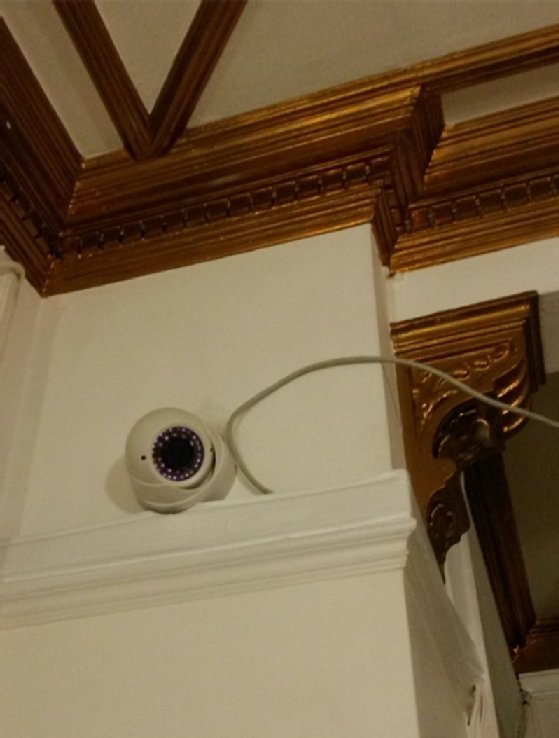
The specialist installed the new cameras with a colleague in December 2017.
“I was instructed by Morales not to inform anyone of the details of the recording system. I was also told to deny – in the event that I was asked – that the cameras recorded sound as he had indicated to us that this was imperative and had come ‘from powers above’.”
In June 2017, Morales asked the IT expert to create a streaming service so that “American friends” could access the cameras in real time.
“This request alarmed me a great deal and, as such, I didn’t carry out his request. I used the excuse that technically speaking it was not possible,” the witness said.
Morales later sent the witness a PowerPoint presentation written in English giving instructions on how to set up live streaming. The witness, who believed the document had been supplied by the US, refused to comply as the request was manifestly illegal.
In 2018, Morales asked the IT specialist to install a microphone in the meeting room used by Assange in the embassy in the base of a PVC fire extinguisher. Another bug was hidden in a plug and left in the lady’s bathroom of the embassy, which was used by Assange for private meetings.
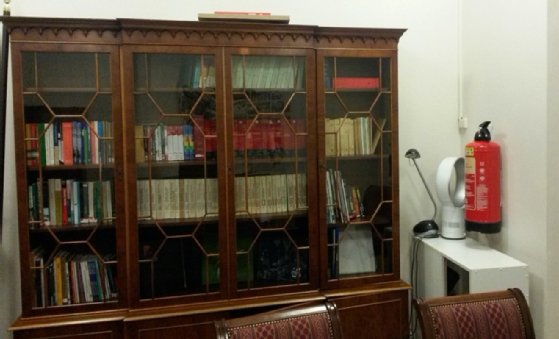
Morales made it clear that he wanted the whole embassy bugged after returning from a trip to the US, but the plan was not carried out when the IT expert challenged its legality.
Morales said the intention was to record conversations with Assange and his visitors, particularly his defence lawyers led by Baltasar Garzón, on behalf of “the Americans”.
Morales had asked the witness to take photographs of objects within the embassy, later explaining that he intended to copy the items and have microphones installed.
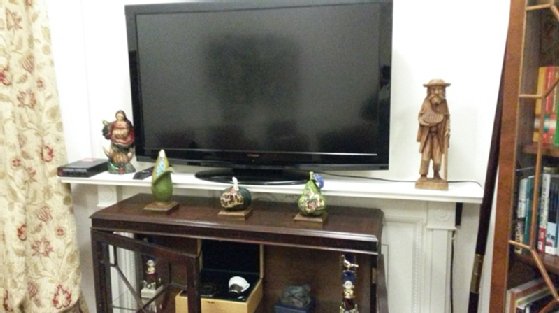
Morales also asked the UC Global staff working in the embassy to take Assange’s fingerprints from a cup he had used and to steal documents from Assange.
In December 2017, Morales asked the witness to “steal a nappy” from a baby that was regularly taken to visit Assange. “This was done so that afterwards they could do a DNA test on the baby’s faeces to find out whether the baby was Mr Assange’s son,” the witness said.
Morales said the Americans wanted to find out the truth.
The witness approached the baby’s mother outside the embassy and told her about the plan.
In December 2017, Morales told UC Global staff that the “Americans were desperate” and wanted to end Assange’s stay in the embassy, the witness claimed.
Morales talked about more extreme measures, such as leaving the embassy door open and blaming it on error, to allow Assange to be kidnapped.
There was also talk of poisoning Assange.
Claims that surveillance was linked to Trump
The IT expert said it was obvious that the spying operation accelerated after mid-2016 when Donald Trump became president.
Embassy staff received daily reports containing the profiles of targets and visitors IDs, which were stored on servers that were accessed by “people from the US”.
Morales ordered the witness to travel to the Ecuadorian Embassy in London every 15 days to change the hard disks from the camera servers.
“The hard disk recordings were extracted every 15 days from cameras with microphones installed in the embassy,” the witness said. “This was delivered to the US personally by David Morales.
“David Morales demanded that I always bring the original recordings…and that I never bring copies,” he said. “This was probably demanded of him by the Americans.”
On several occasions, the witness said, the Ecuadorian authorities requested specific sections of the recordings, and Morales had to travel to the US to search for the originals.
The witness claimed that he had been asked by Morales to place stickers in the windows to make it easier for the US to use lasers to listen to conversations in the embassy.
Between mid-2017 and mid-2018, when UC Global’s contract ended, the witness claimed there was a noticeable increase in Morales’ assets.
He had acquired a new house, bought expensive cars, and employees of UC Global speculated that he was earing up to €200,000 a month.
In late 2018, Assange’s lawyer, Baltasar Garzon, put in a data protection request for all of the material related to Assange held by UC Global.
Morales is claimed to have removed all the material related to the Ecuadorian Embassy and Assange from UC Global’s offices.
Another UC Global employee, who had a 50% share in the company, said it initially had one contract with the Government of Ecuador, signed in 2015.
That included providing security services for the daughters of the then president of Ecuador, Rafael Correa, and later for the Ecuadorian Embassy in London.
UC Global won the contract partly because it employed staff in Spain who could travel to the UK without a visa and easily travel to Ecuador.
The Ecuadorian intelligence service, Senain, was said to be paying UC Global through a company in Miami linked to an Ecuadorian airline.
Las Vegas Sands
In 2016, Morales travelled alone to a security trade fair in Las Vegas. Following the trip, UC Global came back with a “flashy contract” with the casino company Las Vegas Sands.
UC Global was hired to provide security services to the luxury boat, the Queen Miri, owned by its founder and CEO Sheldon Adelson, on its trips to the Mediterranean.
“The contract did not make sense,” said the witness. “The most striking thing about it was that the boat had its own security.”
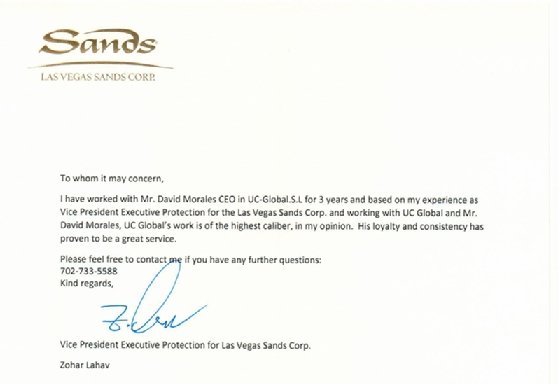
The witness later found out that the contract had been agreed between Morales and Las Vegas Sands chief of security Zohar Lahav.
According to the witness, Morales gathered all the workers into the office in Jerez de la Frontera and told them the company had moved up and would be “playing in the big league”.
Morales told the employee, known as Witness 1, privately that he had switched to “the dark side” and that “the Americans will get us contracts all over the world”.
The witness statement claims that UC Global had entered into illegal agreements with the US authorities to supply them with sensitive information about Assange.
Morales provided monthly security reports to Senain, but suggested that the reports would also go “to the dark side”.
Morales began making regular trips to New York, Chicago and Washington to talk with “our American friends”, the witness claimed.
In 2017, Morales asked for a secure phone and an encrypted computer to talk to his contacts in America.
“At times when I asked insistently who his ‘American friends’ were, David Morales replied ‘US intelligence’,” said the witness.
I am a mercenary
The witness confronted Morales and argued that UC Global should not supply information to the “other side”.
“These arguments would end with David Morales opening his shirt and saying. ‘I am a mercenary through and through’,” the witness said.
Morales’ trips began to escalate in 2017, when Morales began to develop a sophisticated information collection system in the embassy, the statement claims.
“He asked the employees who were physically inside the embassy to deepen their information collection,” the witness said.
He said that Morales showed a real obsession with monitoring and recording lawyers who met with Assange.
In early 2016, during his first visit to the embassy, the witness said he saw an iPad belonging to lawyer Guy Goodwin-Gill, with multiple messages and emails on the home screen. He was later told that the contents of the iPad had been copied.
At end of 2017, UC Global learned that Assange was going to receive a diplomatic passport from Ecuador in order to leave the embassy for a third state and stepped up monitoring of embassy staff.
On another occasion, staff from UC Global opened the briefcase of Andy Muller, an IT expert who was a close personal friend of Assange, and photographed his electronic equipment after he had left his belongings at the entrance.
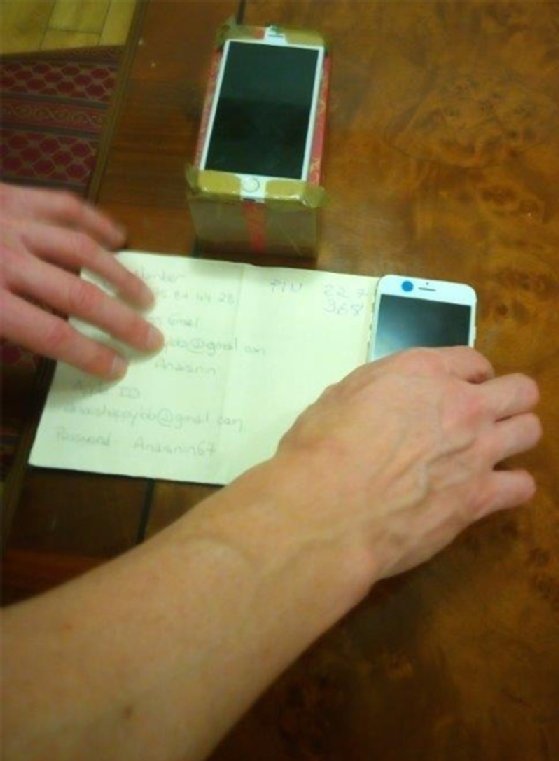
Morales also told UC Global staff that the “Americans were very nervous” about an upcoming visit of a Californian politician – later identified as Dana Rohrabacher – to visit Assange.
“According to David Morales, they had requested him to personally monitor and to control absolutely everything related to that visit,” the witness said.
Later, Morales had made comments about entering the offices of Assange’s legal coordinator, Garzon.
Two weeks after his comments, the national television networks reported that people wearing balaclavas had broken into Garzon’s office.
Spanish court seeks interview with Lahav
In a separate development, the Spanish national court has asked the US Department of Justice to request a statement from Zohar Lahav.
The investigating judge, José de la Mata, told the Department of Justice on 20 August that Lahav was close to Morales and had meetings with him in the US and Spain, and numerous phone calls.
The judge is seeking details of the relationship between Lahav and Morales, the meetings they held in Spain and the US, and whether the meetings discussed information illegally obtained from Assange.
The judge is also seeking information on whether the owner of Las Vegas Sands, Sheldon Adelson, or his head of security, Brian Nigel, had access to information on Assange.
The case continues.
Additional research by Ter Garcia.
Read more about Julian Assange’s September extradition hearing at the Old Bailey
- Lawyers for Julian Assange say the US has introduced an 11th hour indictment against the WikiLeaks founder that provides additional grounds for his extradition.
- On the second day of his extradition hearing at the Old Bailey, judge informs the WikiLeaks founder he could be removed and potentially banned from court for interrupting witnesses.
- US journalism historian and investigative journalist Mark Feldstein tells a UK court that use of the Espionage Act against Assange will have wide implications for the press.
- Trevor Timm, co-founder of the Freedom of the Press Foundation, tells a court that if the US prosecutes Julian Assange, every reporter who receives a secret document will be criminalised.
- WikiLeaks founder Julian Assange will be held under special administrative measures if extradited to the US, said Eric Lewis, a US legal expert, effectively placing him in solitary confinement.
- MEPs and NGOs say they have been denied access to observe extradition proceedings against WikiLeaks founder in Central Criminal Court.
- WikiLeaks founder Julian Assange held back 15,000 documents from publication at the request of the US government, a court heard today.
- Daniel Ellsberg, who leaked highly classified documents that changed the course of the Vietnam War in the 1970s, says WikiLeaks exposed a serious pattern of US war crimes.
- WikiLeaks and its media partners used software developed by an independent non-government organisation (NGO) to redact information that could identify individuals from 400,000 classified documents on the Iraq war, a court heard today.
- New Zealand investigative journalist and author Nicky Hager said that WikiLeaks’ publication of a video showing a US helicopter firing on civilians, along with the publication of secret war logs, ‘electrified’ the world to civilian deaths.
- WikiLeaks founder Julian Assange was offered a “win-win” deal that would allow him “to get on with his life” and benefit US president Donald Trump.
- Khalid El-Masri said that disclosures by WikiLeaks showed that the US had intervened in a German judicial investigation into his torture and kidnapping by the CIA.
- Trump supporter Cassandra Fairbanks was given advanced details of US plans to oust Wikileaks founder Julian Assange from the Ecuadorian Embassy and to arrest him for over documents leaked by former soldier Chelsea Manning.
- WikiLeaks published unredacted cables after password was disclosed in book by Guardian journalist David Leigh.
- Julian Assange is on the autistic spectrum and has a history of depression that would put him at risk of suicide if he is extradited to a US prison.
- Nigel Blackwood, NHS consultant psychiatrist, told the Old Bailey court that although WikiLeaks founder Julian Assange had ‘moderate depression’ and autistic traits it was ‘not unjust’ extradite him.
- Forensic expert questions US claims that Julian Assange conspired to crack military password.
- WikiLeaks founder would be held in a cell the size of a parking space for 22 or 23 hours a day without contact with other inmates before trial.
- WikiLeaks founder Julian Assange would be held alongside convicted terrorist Abu Hamza in a supermax federal prison in Colorado, isolated from other prisoners, if he is extradited to the US, Old Bailey told.









